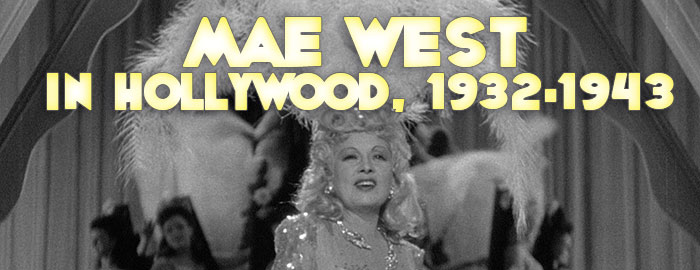

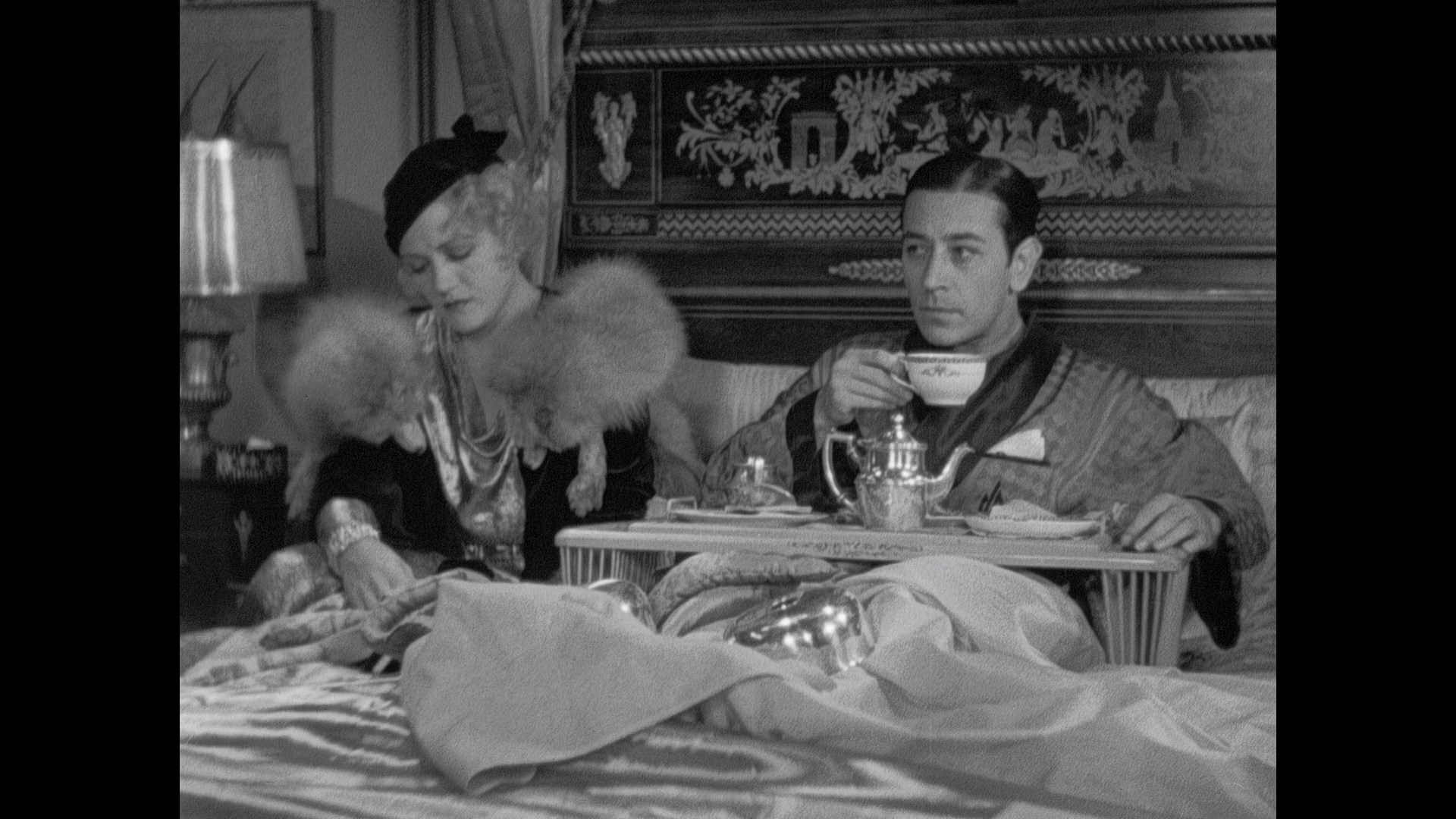 (who inherited most of the early Paramount library where West's most successful titles were made) including a five-film Mae West - The Glamour Collection in 2009, a nine-film Mae West: The Essential Collection in 2016, and an MOD DVD set of nine films, The Mae West Essential Classics Collection. Kino Lorber issued nine of her ten Paramount films on Blu-ray and DVD in mid-2021, but you can get all ten of them in a six-disc U.K. Blu-ray set from Indicator, Mae West in Hollywood: 1932-1943, with the most
(who inherited most of the early Paramount library where West's most successful titles were made) including a five-film Mae West - The Glamour Collection in 2009, a nine-film Mae West: The Essential Collection in 2016, and an MOD DVD set of nine films, The Mae West Essential Classics Collection. Kino Lorber issued nine of her ten Paramount films on Blu-ray and DVD in mid-2021, but you can get all ten of them in a six-disc U.K. Blu-ray set from Indicator, Mae West in Hollywood: 1932-1943, with the most 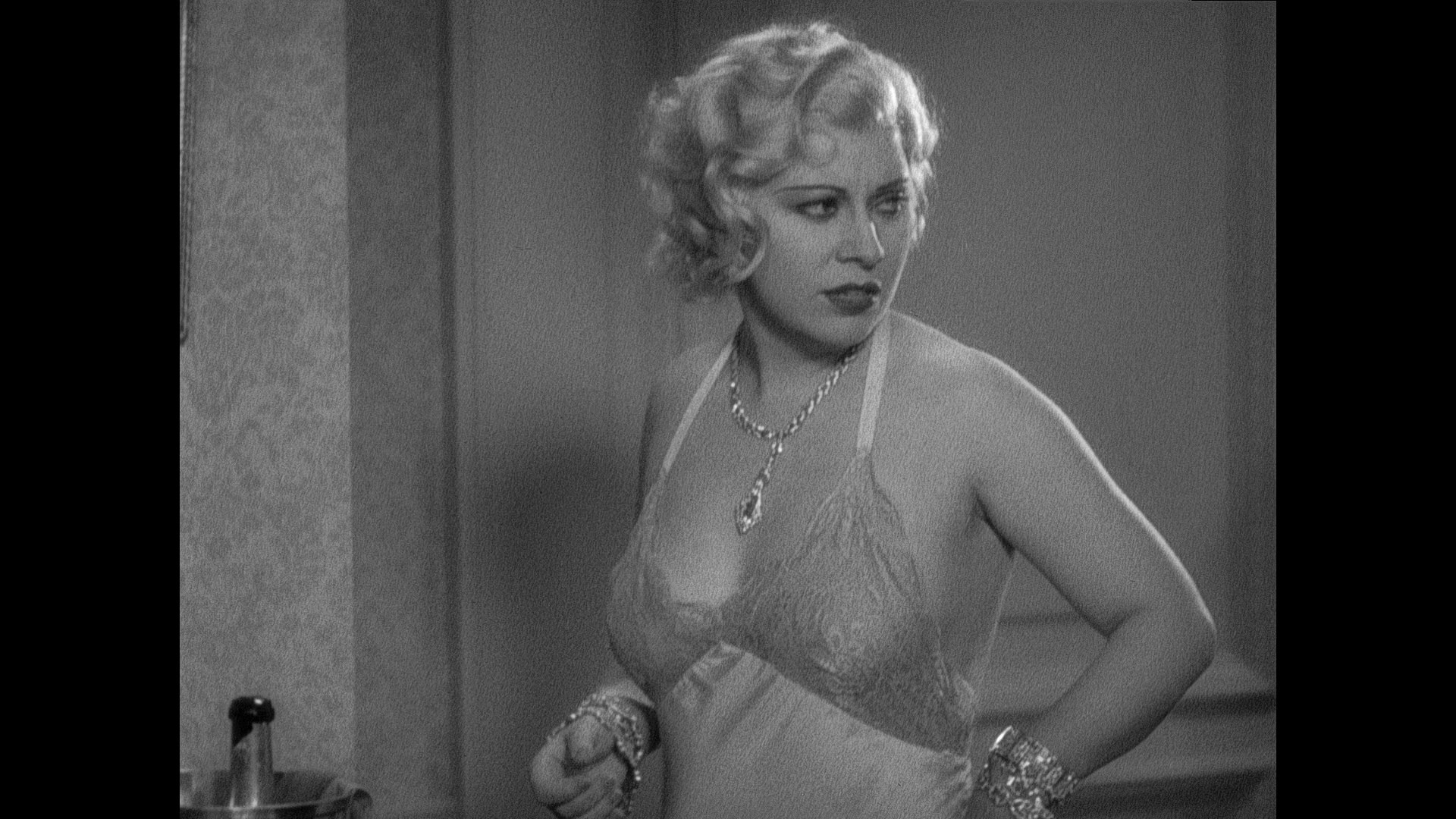 bells and whistles to boot. For the record, there are only two additional West films left to go now on Blu-ray, both from her attempted comeback in the 1970s: the outrageous Myra Breckinridge and Sextette.
bells and whistles to boot. For the record, there are only two additional West films left to go now on Blu-ray, both from her attempted comeback in the 1970s: the outrageous Myra Breckinridge and Sextette. 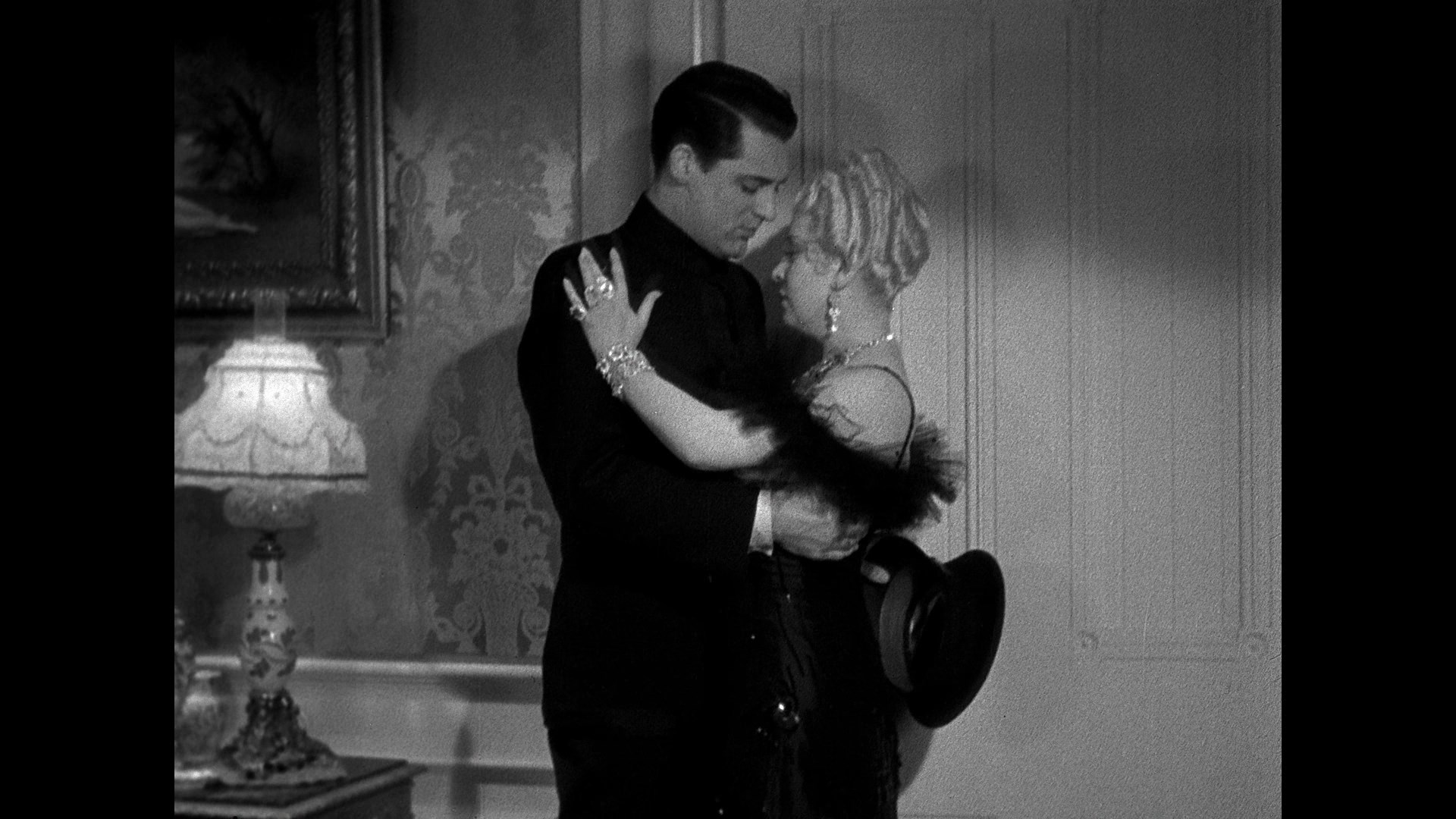 space on that same first disc is West's first starring vehicle and one of her most oft-quoted, She Done Him Wrong, pairing her
space on that same first disc is West's first starring vehicle and one of her most oft-quoted, She Done Him Wrong, pairing her 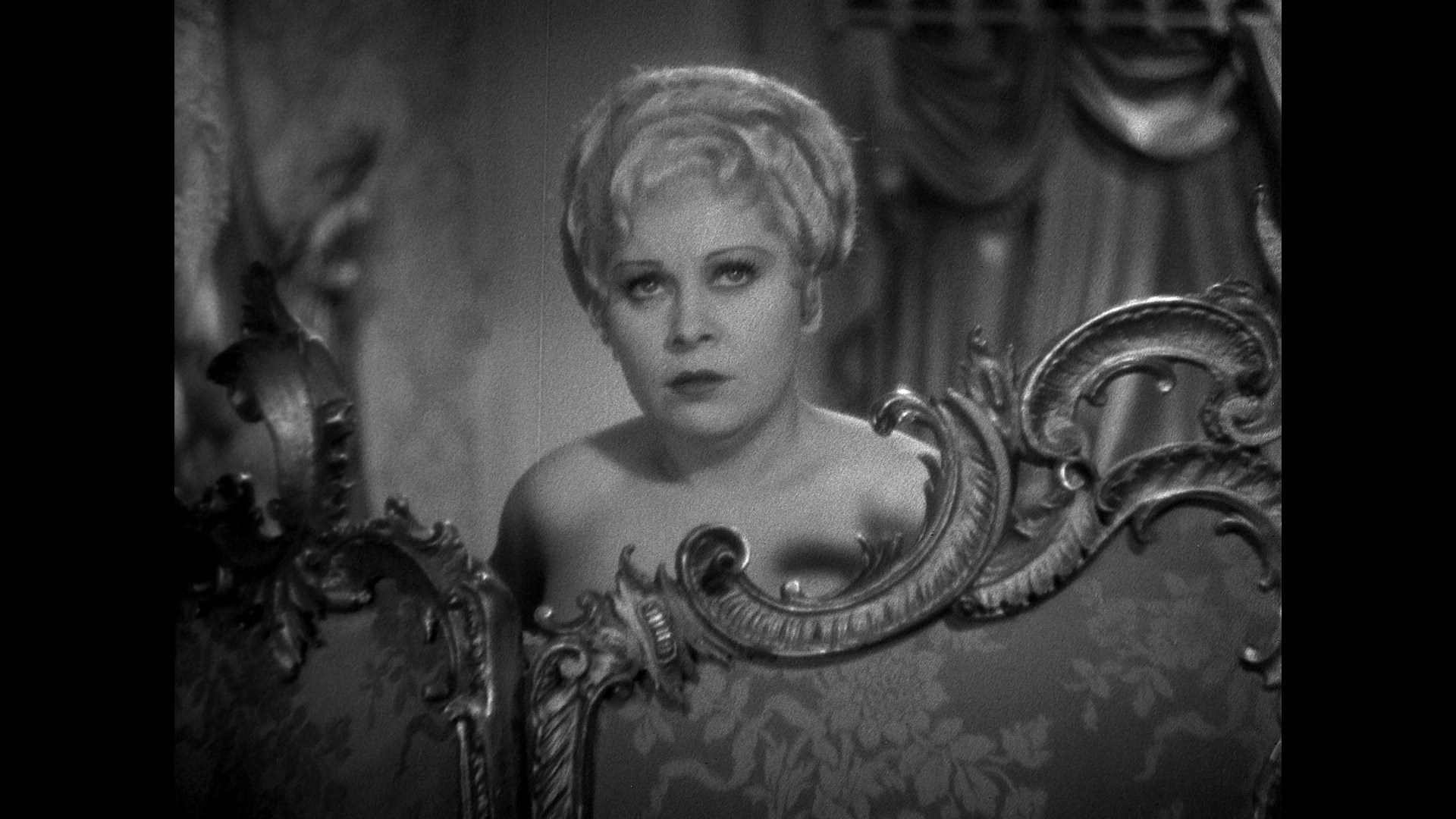 up for the first of two times with a young Cary Grant (hot off his turn opposite Marlene Dietrich in Blonde Venus). Adapted from her scandalous play Diamond Lil, the film changes her name to Lady Lou, a saloon singer in turn of the century New York City. Little does she know that her place of employment is a hotbed of crime and deceit thanks to her boss, Gus (Beery), and miscreants like her ex-boyfriend, Chick Clark (Moore). Meanwhile a fed named Cummings (Grant) has set himself up as the head of a mission next door to keep an eye on the place and crack down when the time is right, but will Lou get caught up in the middle? Complete with musical numbers and double entrendres galore, She Done Him Wrong mostly uses its threadbare plot as a vehicle for West to strut her stuff. She actually has pretty solid charisma with Grant, but he's far from the razor-sharp, suave megastar he'd become in just a few years. This one also turned up from Kino Lorber (with separate commentaries by Kat Ellinger and David Del Valle, plus a Robert Osborne intro and "She Done Him Right' cartoon); it looks the same here with a 4K scan made in 2017, which probably does the best it can with the surviving elements. It isn't the most pristine film in the set but looks fine given its age and the relative condition of most early Paramount properties. Here you get a new commentary by Pamela Hutchinson, who does a deft job of laying out the history behind the source play, the tangling with the Production Code, West's sudden rise to stardom, and the depiction of womanhood she projected that remains striking today. Also included is the audio of a West appearance at UCLA in 1971 speaking with (a very out of breath) Bob Elias, lasting for 25m23s as she answers questions about her career. It's a little tough to follow since there's some obvious physical comedy going on that we can't see, but it's great to hear her in fine spirits talking to the students. She also touches on her supposed discovery of Cary Grant as well as her acrimonious relationship with W.C. Fields, but more on that later. After that you get the Night After Night trailer, galleries for both films (19 and 24 images respectively), the 1933 She Done Him Right cartoon (7m54s) with Pooch the Pup, and another cartoon, 1933's The Merry Old Soul (8m2s), featuring Oswald the Rabbit and a host of Hollywood caricatures including West.
up for the first of two times with a young Cary Grant (hot off his turn opposite Marlene Dietrich in Blonde Venus). Adapted from her scandalous play Diamond Lil, the film changes her name to Lady Lou, a saloon singer in turn of the century New York City. Little does she know that her place of employment is a hotbed of crime and deceit thanks to her boss, Gus (Beery), and miscreants like her ex-boyfriend, Chick Clark (Moore). Meanwhile a fed named Cummings (Grant) has set himself up as the head of a mission next door to keep an eye on the place and crack down when the time is right, but will Lou get caught up in the middle? Complete with musical numbers and double entrendres galore, She Done Him Wrong mostly uses its threadbare plot as a vehicle for West to strut her stuff. She actually has pretty solid charisma with Grant, but he's far from the razor-sharp, suave megastar he'd become in just a few years. This one also turned up from Kino Lorber (with separate commentaries by Kat Ellinger and David Del Valle, plus a Robert Osborne intro and "She Done Him Right' cartoon); it looks the same here with a 4K scan made in 2017, which probably does the best it can with the surviving elements. It isn't the most pristine film in the set but looks fine given its age and the relative condition of most early Paramount properties. Here you get a new commentary by Pamela Hutchinson, who does a deft job of laying out the history behind the source play, the tangling with the Production Code, West's sudden rise to stardom, and the depiction of womanhood she projected that remains striking today. Also included is the audio of a West appearance at UCLA in 1971 speaking with (a very out of breath) Bob Elias, lasting for 25m23s as she answers questions about her career. It's a little tough to follow since there's some obvious physical comedy going on that we can't see, but it's great to hear her in fine spirits talking to the students. She also touches on her supposed discovery of Cary Grant as well as her acrimonious relationship with W.C. Fields, but more on that later. After that you get the Night After Night trailer, galleries for both films (19 and 24 images respectively), the 1933 She Done Him Right cartoon (7m54s) with Pooch the Pup, and another cartoon, 1933's The Merry Old Soul (8m2s), featuring Oswald the Rabbit and a host of Hollywood caricatures including West. 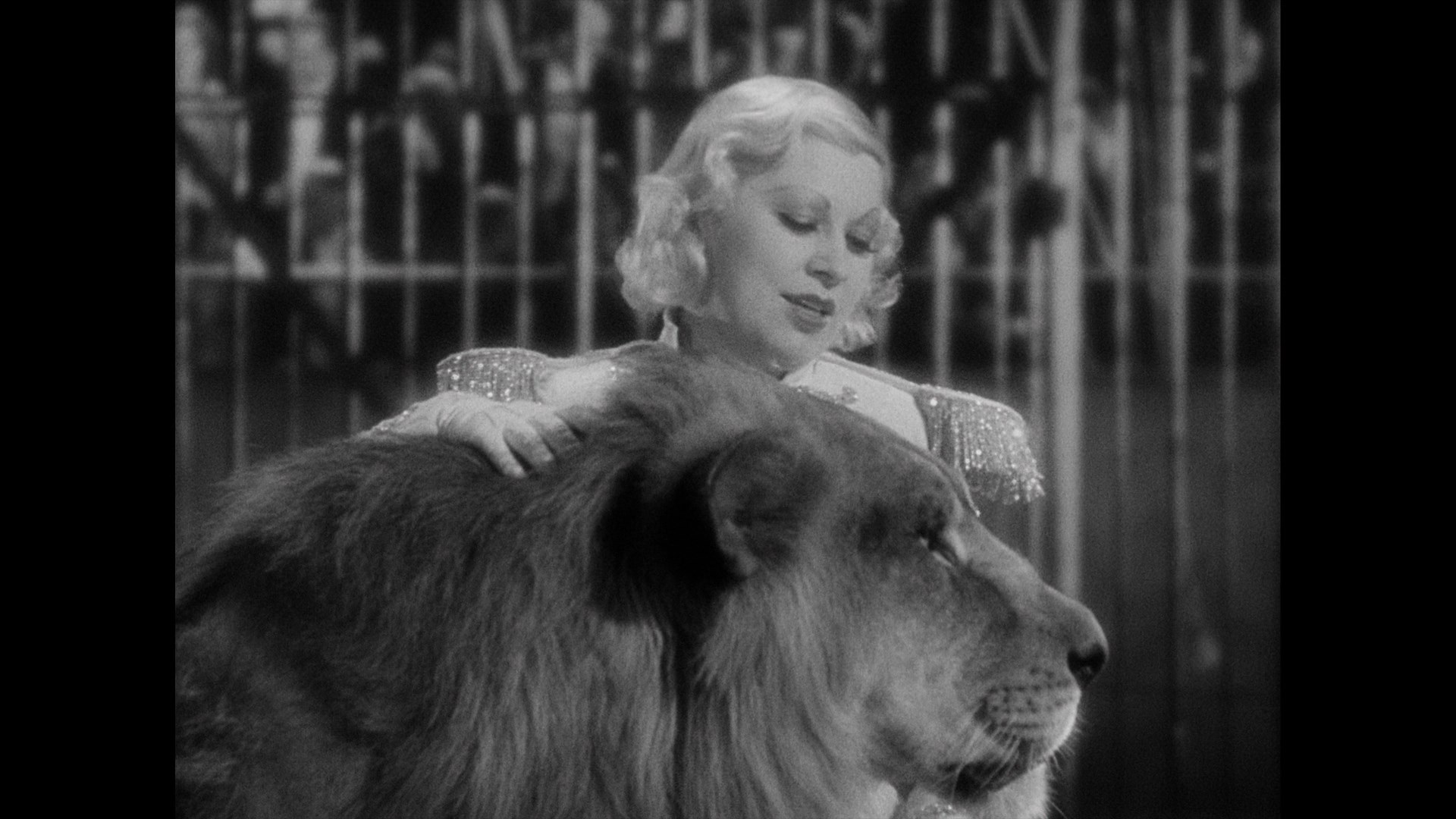 horoscope and
horoscope and 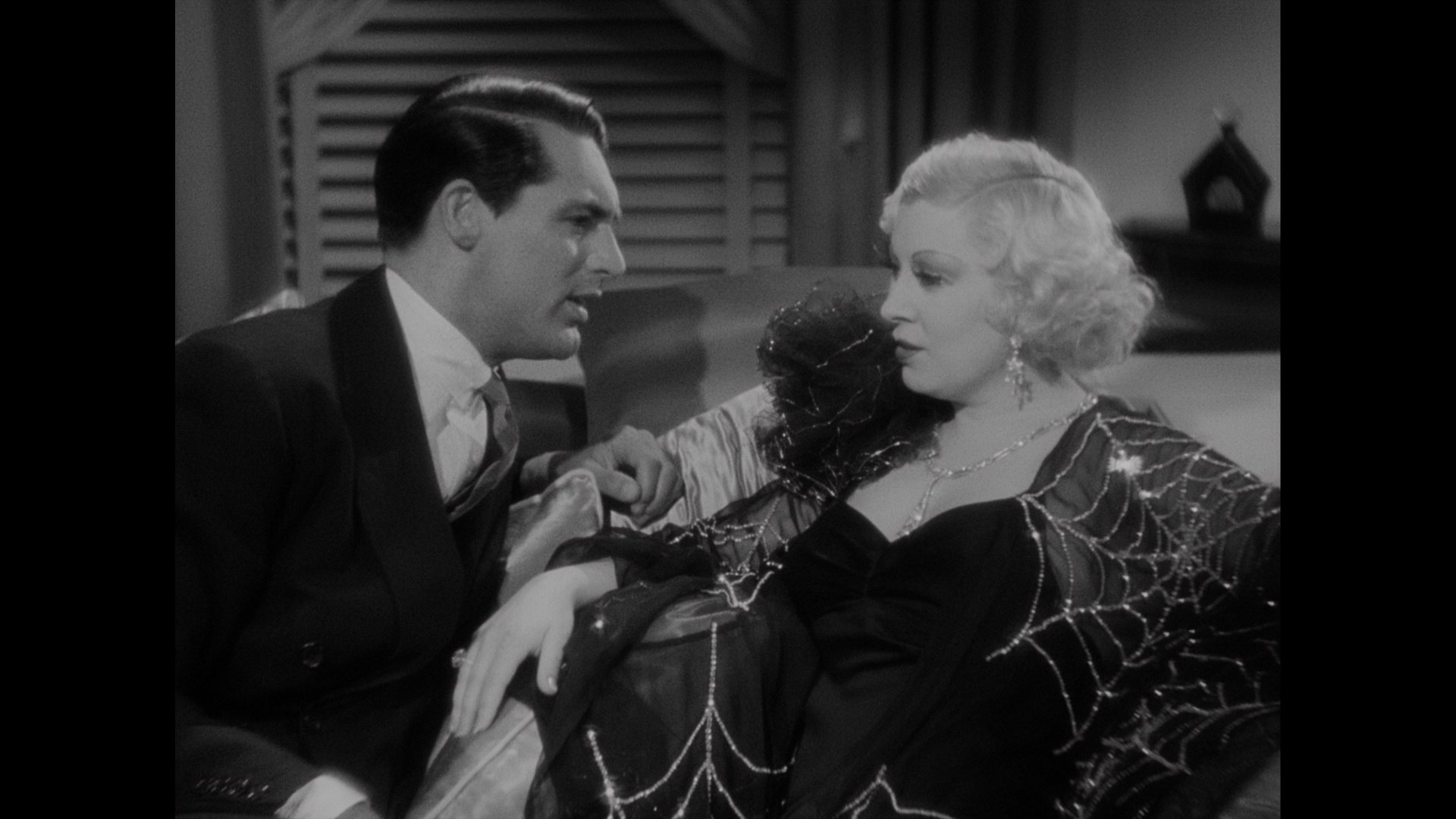 tell her she'll cross paths with a very wealthy man, she decides to use all of her natural gifts to score the man of her dreams. After an attempted shakedown goes wrong, Tira ends up striking a deal with boss Big Bill (Arnold) that has her performing wild circus animal acts that catch the attention of two very different men, Kirk (Taylor) and Jack (Grant again). Romantic and professional complications ensue, all as a device to reel out some fun West songs and some of her most immortal one-liners (especially "When I'm good, I'm very good. But when I'm bad, I'm better."). From a technical standpoint it's also a lot of fun to see how they pass off West as a professional lion tamer, with crafty rear projection and optical tricks working better than you'd expect (not to mention one undeniably real hands-on bit).
tell her she'll cross paths with a very wealthy man, she decides to use all of her natural gifts to score the man of her dreams. After an attempted shakedown goes wrong, Tira ends up striking a deal with boss Big Bill (Arnold) that has her performing wild circus animal acts that catch the attention of two very different men, Kirk (Taylor) and Jack (Grant again). Romantic and professional complications ensue, all as a device to reel out some fun West songs and some of her most immortal one-liners (especially "When I'm good, I'm very good. But when I'm bad, I'm better."). From a technical standpoint it's also a lot of fun to see how they pass off West as a professional lion tamer, with crafty rear projection and optical tricks working better than you'd expect (not to mention one undeniably real hands-on bit). 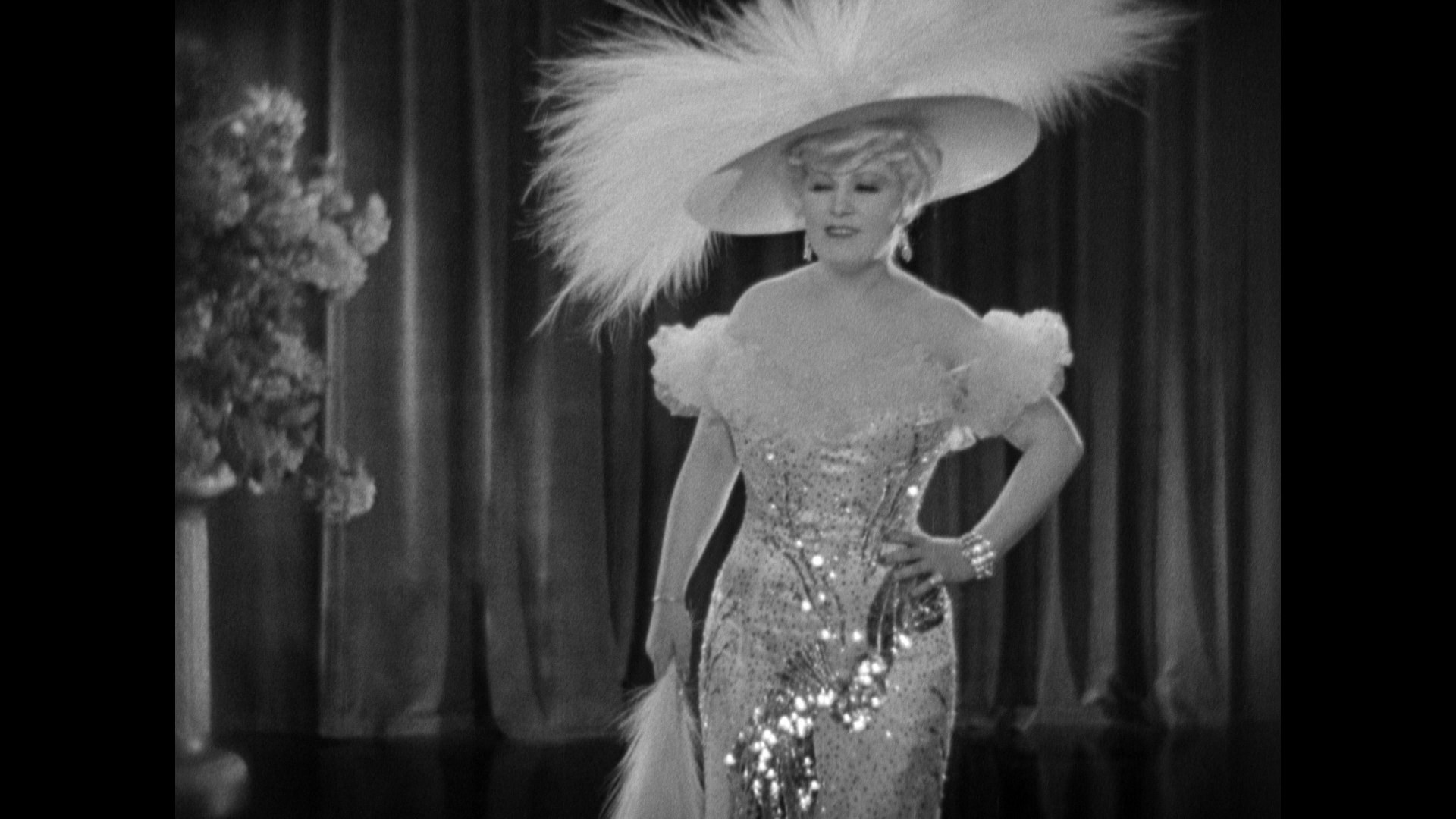 selling point enough
selling point enough 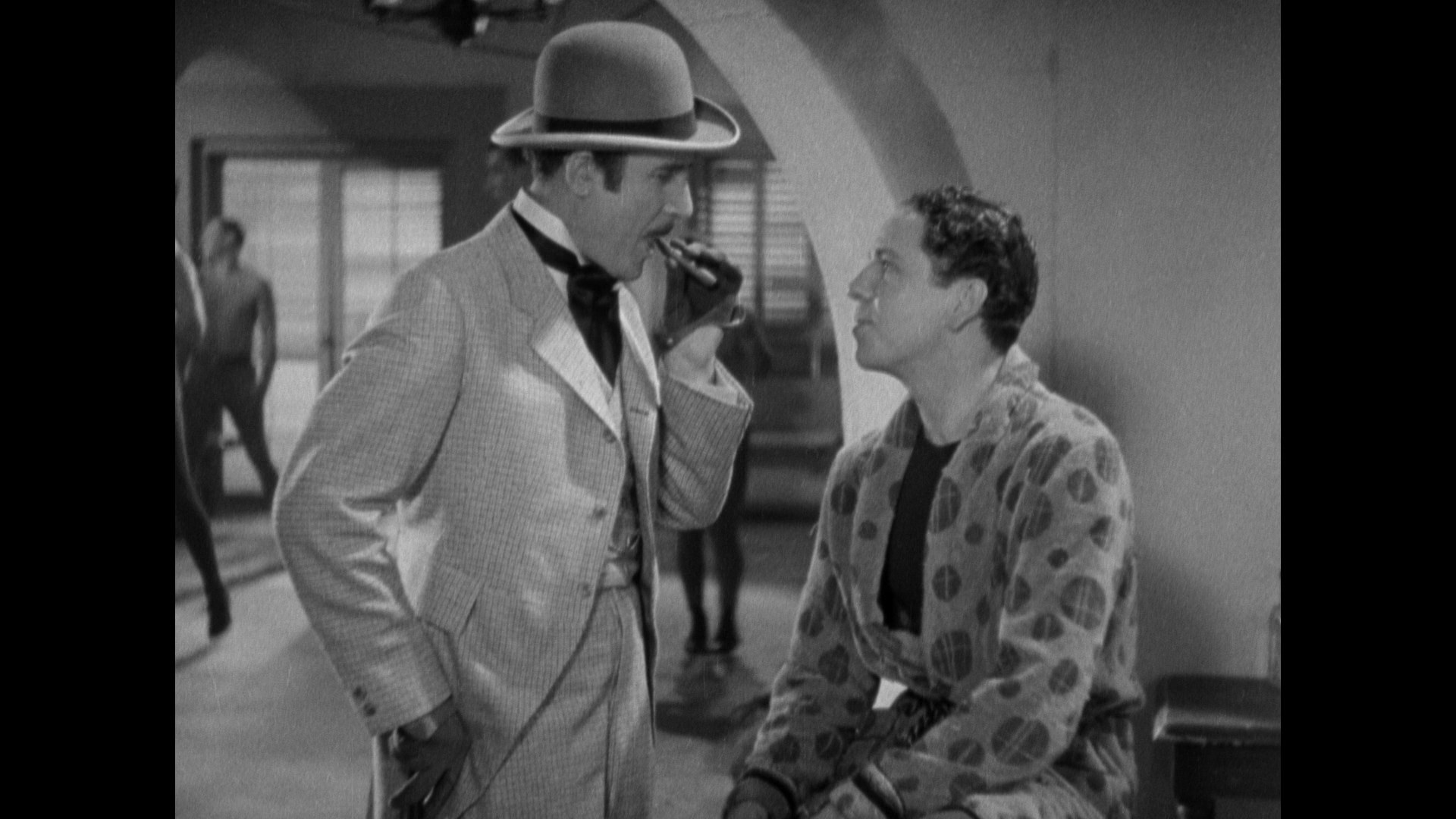 to justify the film right there. Originally entitled It Ain't No Sin before the Production Code put its foot down, this was a solid effort from reliable '30s comedy director Leo McCarey (Duck Soup, The Awful Truth) with West cast as Ruby Carter -- yep, another showgirl, here "The Most Talked About Woman in America" in the 1890s. Considering she's first seen on stage in eye-popping satin outfits dressed as a gigantic butterfly, bat, rose, spider, etc., it's easy to see why. Unfortunately she's tangled up with a bad crowd and decides to hightail it to New Orleans for a fresh start, but trouble follows as boyfriend boxer Tiger Kid (Pryor) tracks her down and gets both of them tangled in a bunch of random criminal shenanigans. Mostly it's all an excuse for lots of stage performances since the Code had started to crack down hard, with West bearing a lot of the brunt of their wrath. She still gets a few fun zingers in here and there though, and the costumes alone make it prime eye candy. The U.S. disc featured a Deighan commentary, but no chat track is here for the U.K. edition. However, you do get two Super 8 versions of I'm No Angel (8m2s and 17m46s), trailers for both films, and two image galleries for the features (44 and 37 images, including some awesome fashion promo shots).
to justify the film right there. Originally entitled It Ain't No Sin before the Production Code put its foot down, this was a solid effort from reliable '30s comedy director Leo McCarey (Duck Soup, The Awful Truth) with West cast as Ruby Carter -- yep, another showgirl, here "The Most Talked About Woman in America" in the 1890s. Considering she's first seen on stage in eye-popping satin outfits dressed as a gigantic butterfly, bat, rose, spider, etc., it's easy to see why. Unfortunately she's tangled up with a bad crowd and decides to hightail it to New Orleans for a fresh start, but trouble follows as boyfriend boxer Tiger Kid (Pryor) tracks her down and gets both of them tangled in a bunch of random criminal shenanigans. Mostly it's all an excuse for lots of stage performances since the Code had started to crack down hard, with West bearing a lot of the brunt of their wrath. She still gets a few fun zingers in here and there though, and the costumes alone make it prime eye candy. The U.S. disc featured a Deighan commentary, but no chat track is here for the U.K. edition. However, you do get two Super 8 versions of I'm No Angel (8m2s and 17m46s), trailers for both films, and two image galleries for the features (44 and 37 images, including some awesome fashion promo shots). 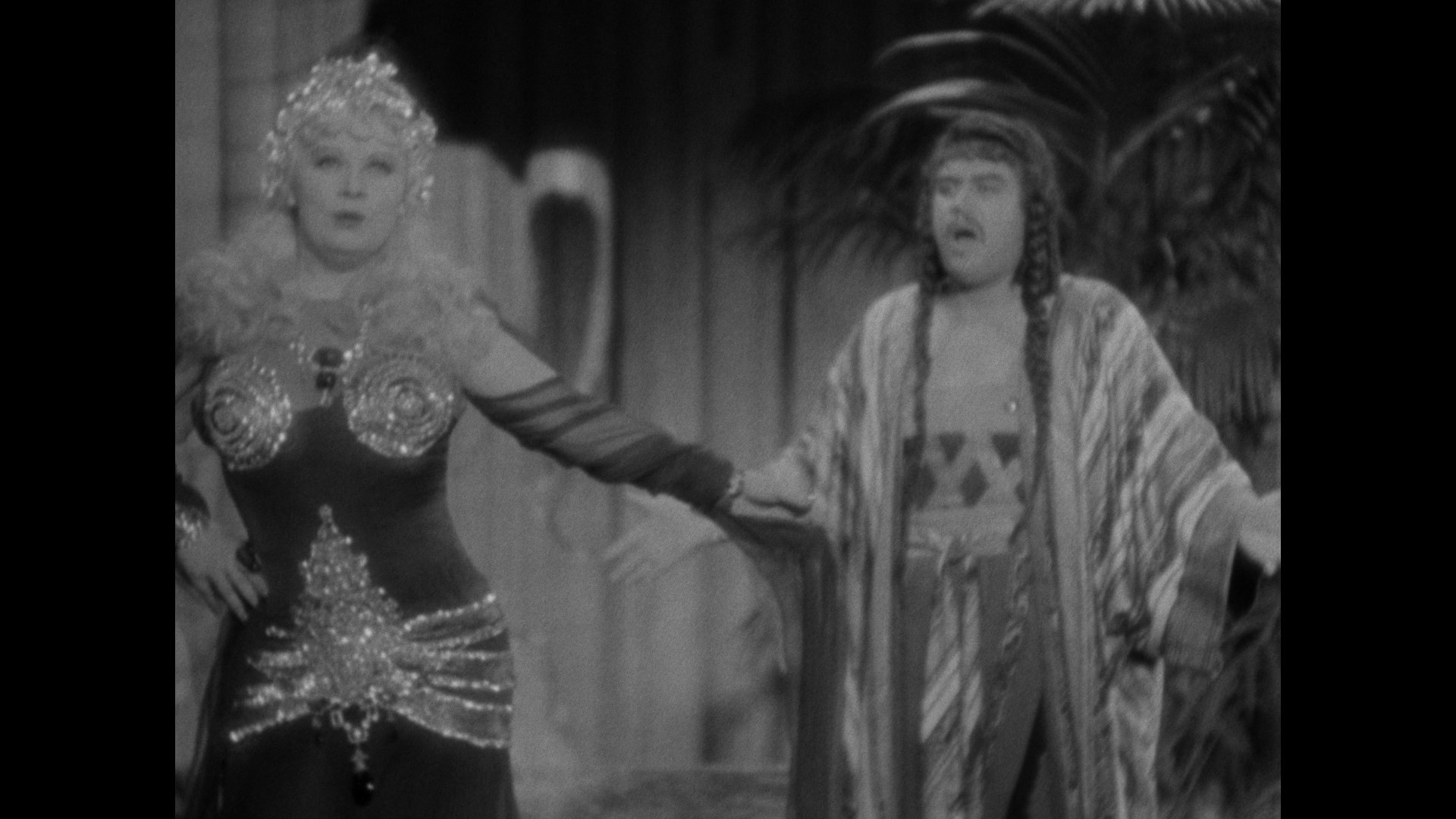
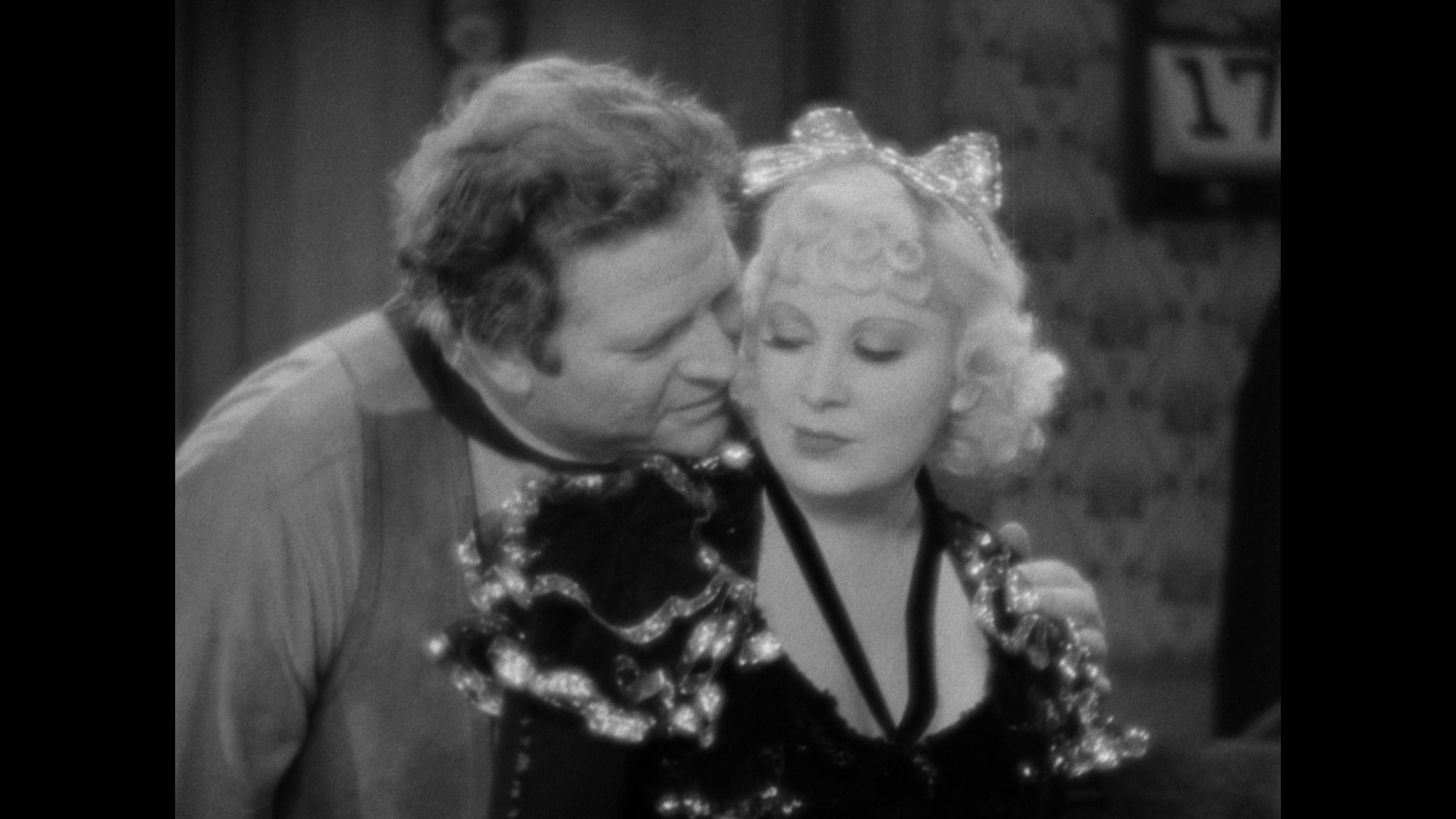 On we go to disc three with Goin' to Town, a 1935 western comedy with Mae as Cleo Borden, a saloon singer with a reputation that says "five minutes with her and a guy's lucky to get away with his vaccinations." The top man in her roster is British immigrant Edward Carrington (Cavanaugh), but for financial security she decides to get hitched to the wealthy Fletcher Carlton (Owsley) instead. Of course, that plan turns out to have a few kinks in it as Mae sings and quips her way to happiness on her own terms. The toll the Code was taking is even more obvious here, but West also seems to be at ease and having fun in the settings ranging from a dusty western town to the swanky backdrops of Buenos Aires. Again her outfits are completely out of control with some head wear you have to see to believe, not to mention enough sequins to blow out your average film projector.
On we go to disc three with Goin' to Town, a 1935 western comedy with Mae as Cleo Borden, a saloon singer with a reputation that says "five minutes with her and a guy's lucky to get away with his vaccinations." The top man in her roster is British immigrant Edward Carrington (Cavanaugh), but for financial security she decides to get hitched to the wealthy Fletcher Carlton (Owsley) instead. Of course, that plan turns out to have a few kinks in it as Mae sings and quips her way to happiness on her own terms. The toll the Code was taking is even more obvious here, but West also seems to be at ease and having fun in the settings ranging from a dusty western town to the swanky backdrops of Buenos Aires. Again her outfits are completely out of control with some head wear you have to see to believe, not to mention enough sequins to blow out your average film projector.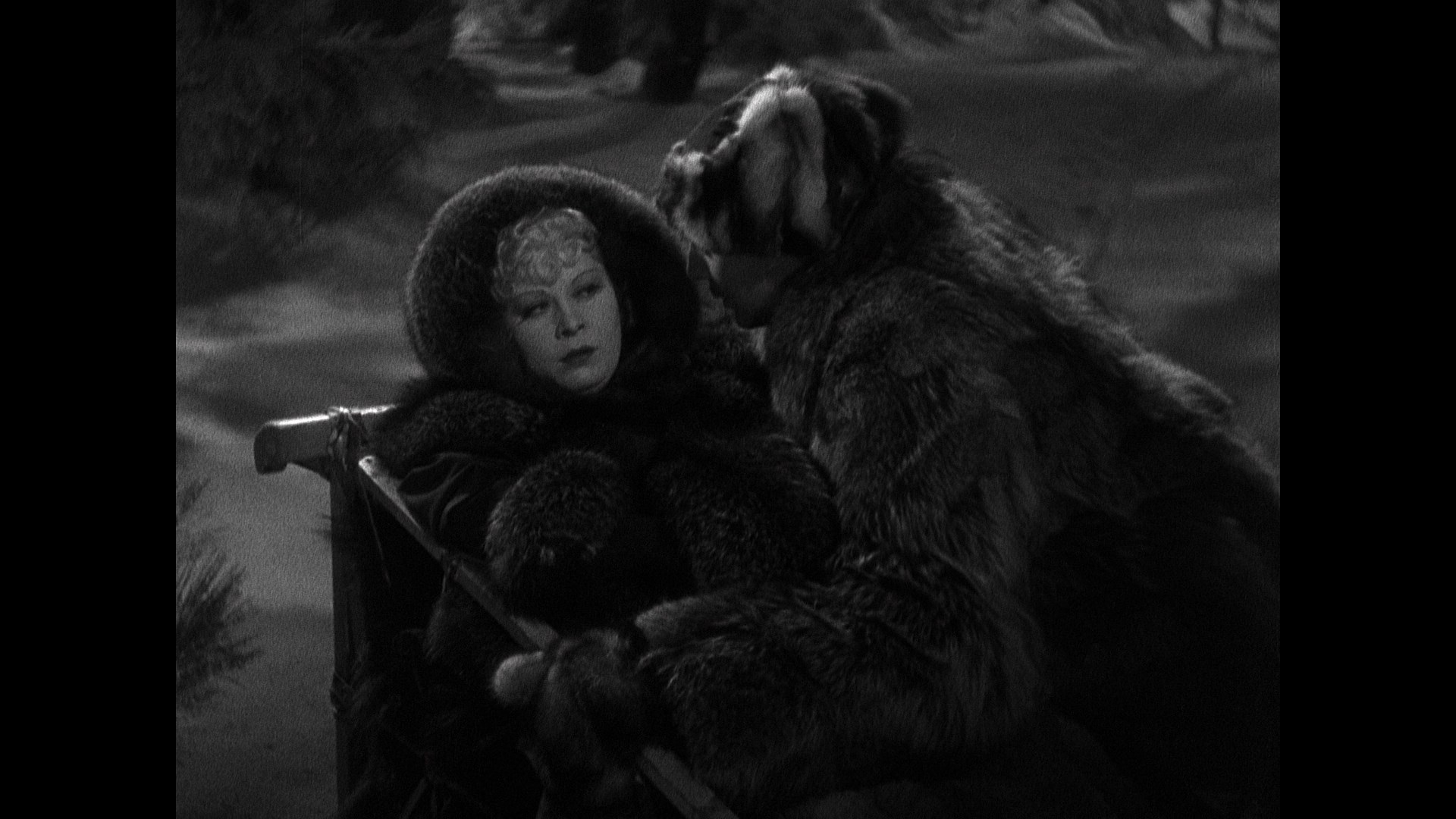 fills out the other half of the disc, with Hollywood vet Raoul Walsh (White Heat, High Sierra) taking the
fills out the other half of the disc, with Hollywood vet Raoul Walsh (White Heat, High Sierra) taking the 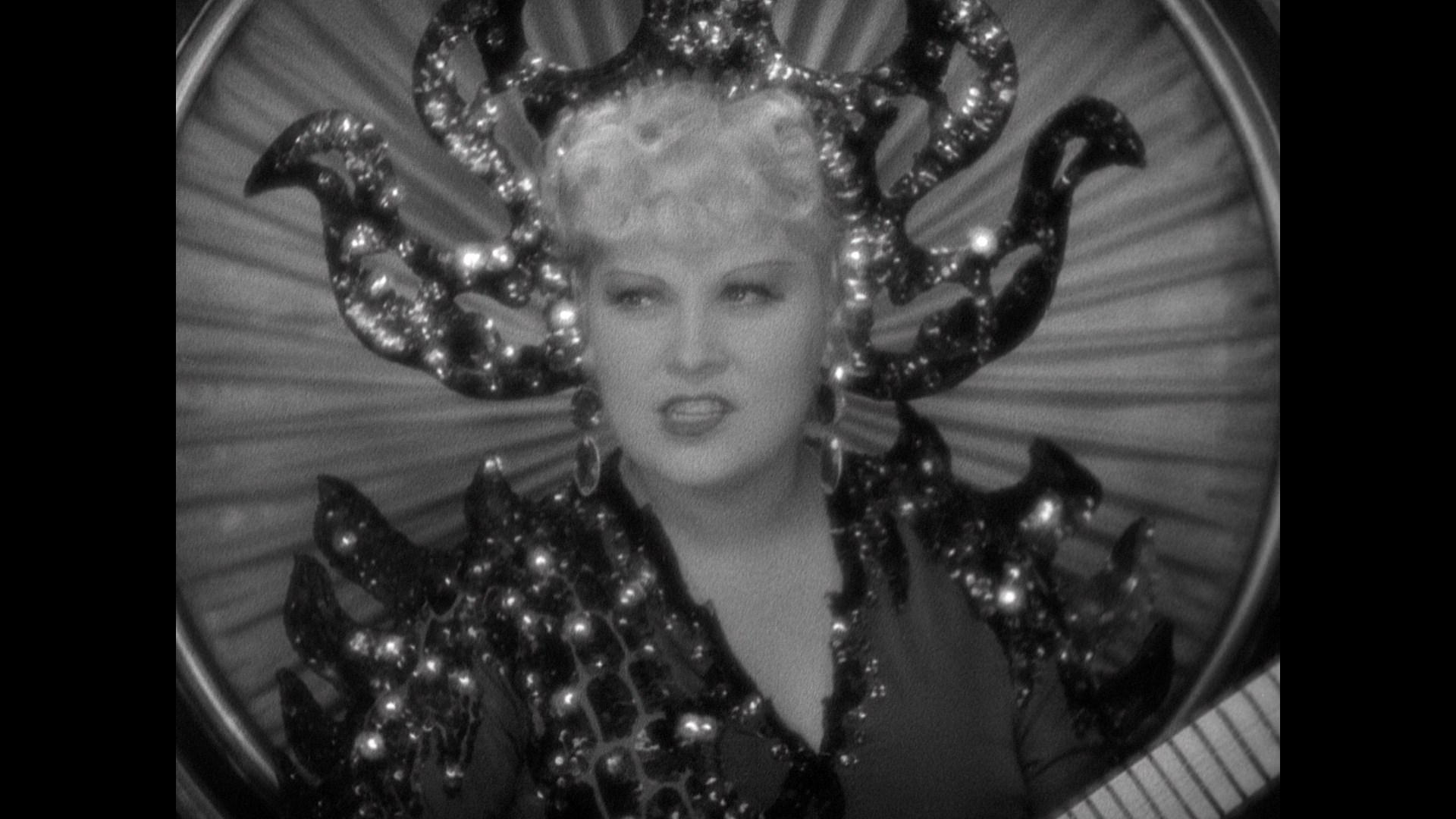 reins for a comic adventure that starts in 1980s San Francisco Chinatown. Kept under the thumb of a sadistic nightclub owner, performer Rose Carlton (West, of course) kills her way to freedom and takes off to Alaska where she poses as a missionary named Annie and ends up in a triangle of sorts between ship captain Bull Brackett (McLaglen) and ranger Jack Forrest (Reed). Though somewhat weirdly plotted due to the Code demanding the removal of some key plot points, this is an solid outing for West with far more drama than usual with more sparing use of her trademark quips (including a weirdly perverse final scene). Par the course for the era, there's some Asian stereotyping throughout that may sit uncomfortably today, but that's up to your own mileage to determine. Both films were also out earlier from Kino Lorber (with commentaries by Kat Ellinger and Heller-Nicholas / Nelson respectively), while here Klondike Annie gets a new audio commentary by Eloise Ross who charts the Production Code journey of the film, West's career at the time, the transformation of her persona, and the film's tonal differences from the rest of her work. Both films are in fine shape, with Goin' to Town edging out Klondike's 2014 scan with its 2018 4K restoration. In "Downtown Girl" (33m24s), film historian Lucy Bolton explores the unique quality of West's star power as a singular and irrepressible presence who dominates every feature designed around her regardless of the
reins for a comic adventure that starts in 1980s San Francisco Chinatown. Kept under the thumb of a sadistic nightclub owner, performer Rose Carlton (West, of course) kills her way to freedom and takes off to Alaska where she poses as a missionary named Annie and ends up in a triangle of sorts between ship captain Bull Brackett (McLaglen) and ranger Jack Forrest (Reed). Though somewhat weirdly plotted due to the Code demanding the removal of some key plot points, this is an solid outing for West with far more drama than usual with more sparing use of her trademark quips (including a weirdly perverse final scene). Par the course for the era, there's some Asian stereotyping throughout that may sit uncomfortably today, but that's up to your own mileage to determine. Both films were also out earlier from Kino Lorber (with commentaries by Kat Ellinger and Heller-Nicholas / Nelson respectively), while here Klondike Annie gets a new audio commentary by Eloise Ross who charts the Production Code journey of the film, West's career at the time, the transformation of her persona, and the film's tonal differences from the rest of her work. Both films are in fine shape, with Goin' to Town edging out Klondike's 2014 scan with its 2018 4K restoration. In "Downtown Girl" (33m24s), film historian Lucy Bolton explores the unique quality of West's star power as a singular and irrepressible presence who dominates every feature designed around her regardless of the 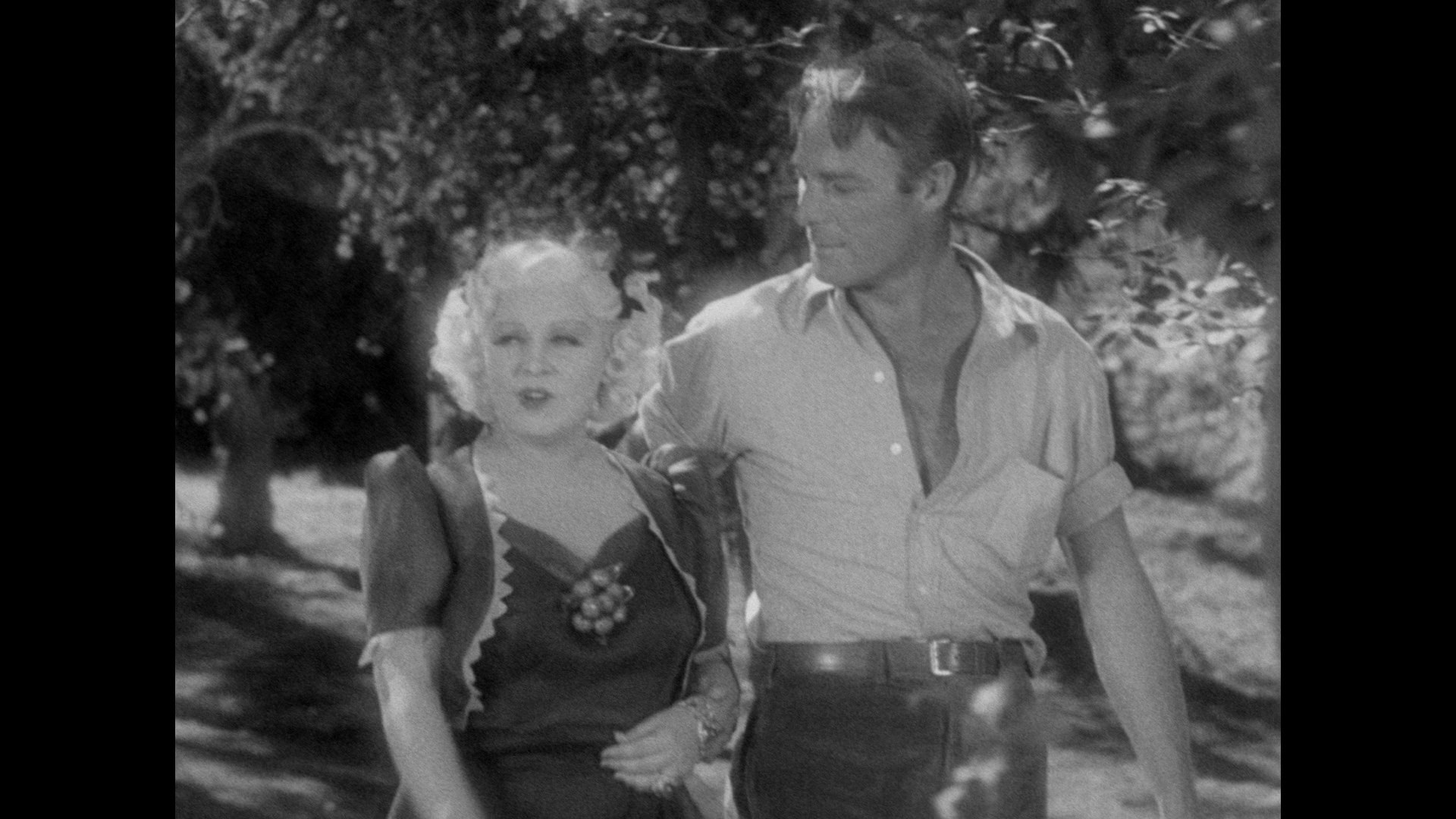 men cast
men cast 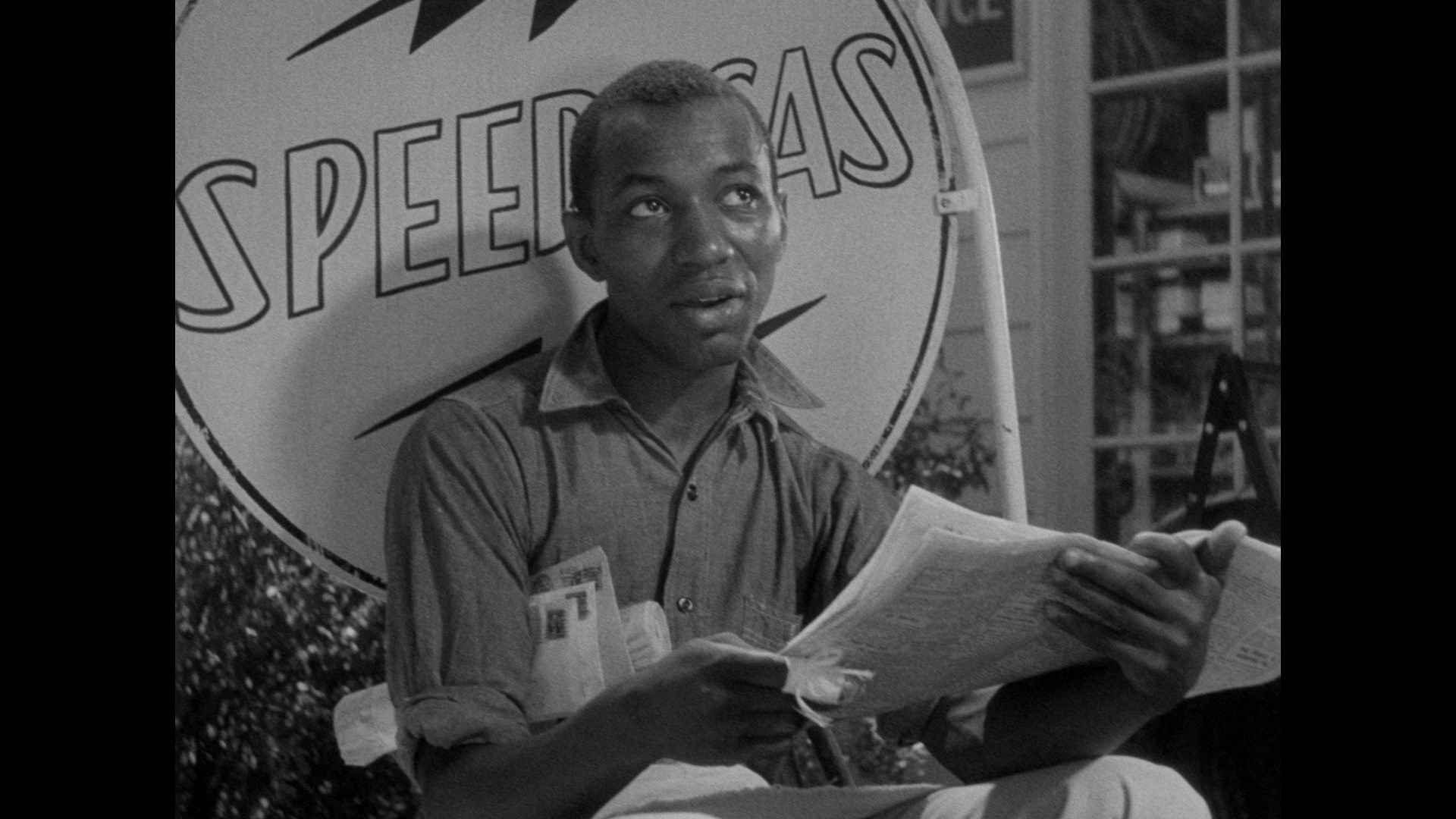 around her. Also included are the trailer for Goin' to Town and galleries for both films (48 and 42 images).
around her. Also included are the trailer for Goin' to Town and galleries for both films (48 and 42 images). 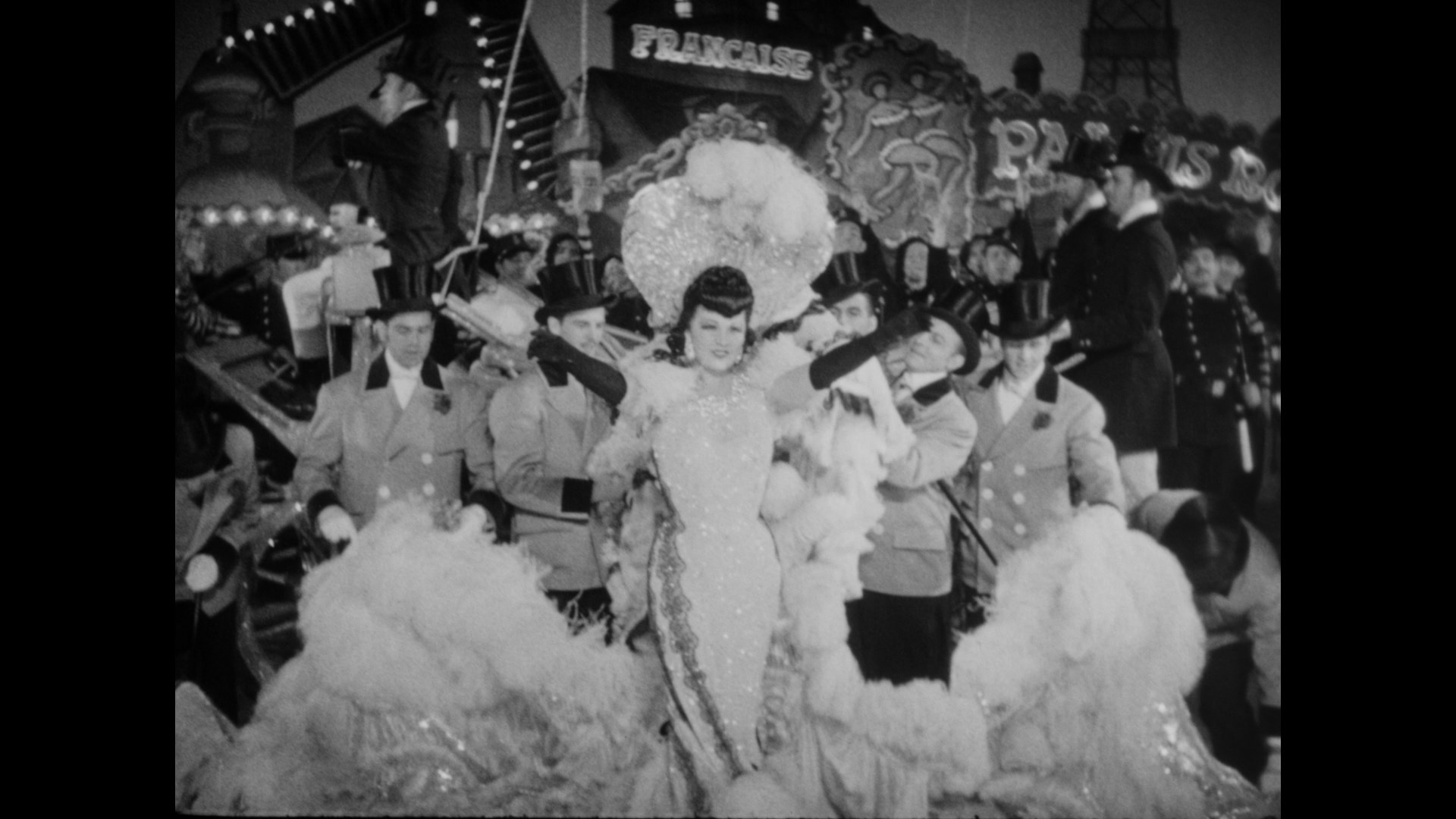 The last of the Paramount run here is Every Day's a Holiday from the same year, a fluffy little trifle
The last of the Paramount run here is Every Day's a Holiday from the same year, a fluffy little trifle 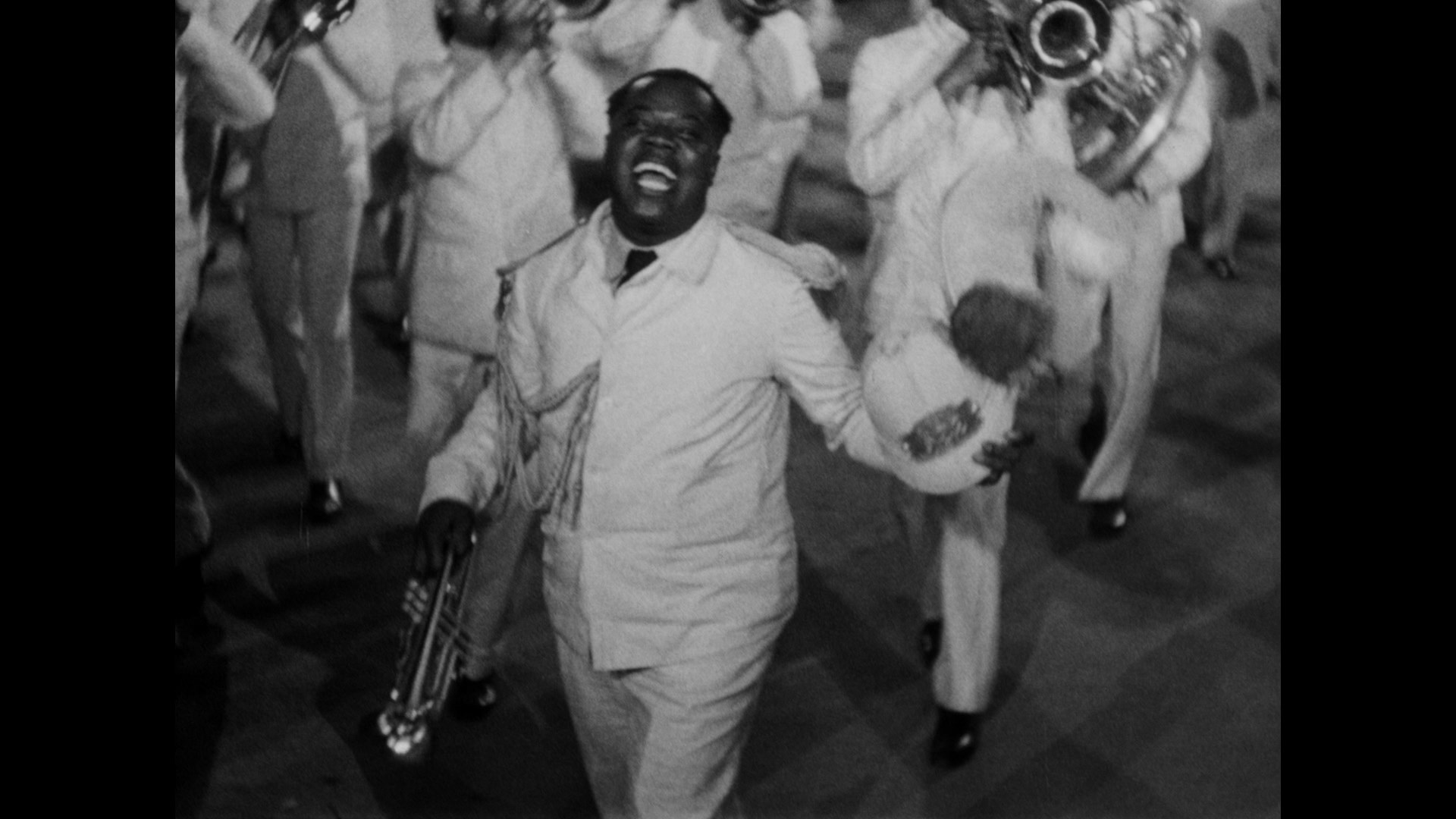 that throws West back to the end of the 1800s. On top of that she gets to slap on a ridiculous exaggerated French accent as Peaches O'Day, a con artist who has to pose as a black-wigged singer named Fifi. Soon she's stuck in the middle of some political chicanery involving the the chief of police (Nolan) and police captain McCarey (Lowe) who has a sweet spot for Peaches. Fizzy and fun, this one doesn't try to shake up the formula but has its share of delights including a great appearance late in the film by the great Louis Armstrong, who of course walks off with every second of his screen time. Both films here are taken from 2021 4K scans and look excellent throughout, though Every Day is loaded with opticals (tons of dissolves!) that obviously knock the resolution down here and there. The U.S. discs featured commentaries by Lee Gambin and Ellinger for the respective films, and here Go West Young Man has a new commentary by film historian Nora "The Nitrate Diva" Fiore gliding through the essentials of director Henry Hathaway, the stage play origins, the conventions of the era being referenced in the film, and the backgrounds of the significant players. In "The Only Way Is West" (18m46s), film critic Christina Newland offers her own take on West with a focus on her writing both in film and otherwise as well as the agency she exerted over her career that was unusually steadfast for the time. Finally the disc closes out with the trailer for Every Day's a Holiday and galleries for both films (27 and 43 images).
that throws West back to the end of the 1800s. On top of that she gets to slap on a ridiculous exaggerated French accent as Peaches O'Day, a con artist who has to pose as a black-wigged singer named Fifi. Soon she's stuck in the middle of some political chicanery involving the the chief of police (Nolan) and police captain McCarey (Lowe) who has a sweet spot for Peaches. Fizzy and fun, this one doesn't try to shake up the formula but has its share of delights including a great appearance late in the film by the great Louis Armstrong, who of course walks off with every second of his screen time. Both films here are taken from 2021 4K scans and look excellent throughout, though Every Day is loaded with opticals (tons of dissolves!) that obviously knock the resolution down here and there. The U.S. discs featured commentaries by Lee Gambin and Ellinger for the respective films, and here Go West Young Man has a new commentary by film historian Nora "The Nitrate Diva" Fiore gliding through the essentials of director Henry Hathaway, the stage play origins, the conventions of the era being referenced in the film, and the backgrounds of the significant players. In "The Only Way Is West" (18m46s), film critic Christina Newland offers her own take on West with a focus on her writing both in film and otherwise as well as the agency she exerted over her career that was unusually steadfast for the time. Finally the disc closes out with the trailer for Every Day's a Holiday and galleries for both films (27 and 43 images).  Little Chickadee, which marked her only star vehicle for Universal who paired her up with one of its biggest stars, W.C. Fields. The two actually didn't get along so well, especially with the latter
Little Chickadee, which marked her only star vehicle for Universal who paired her up with one of its biggest stars, W.C. Fields. The two actually didn't get along so well, especially with the latter 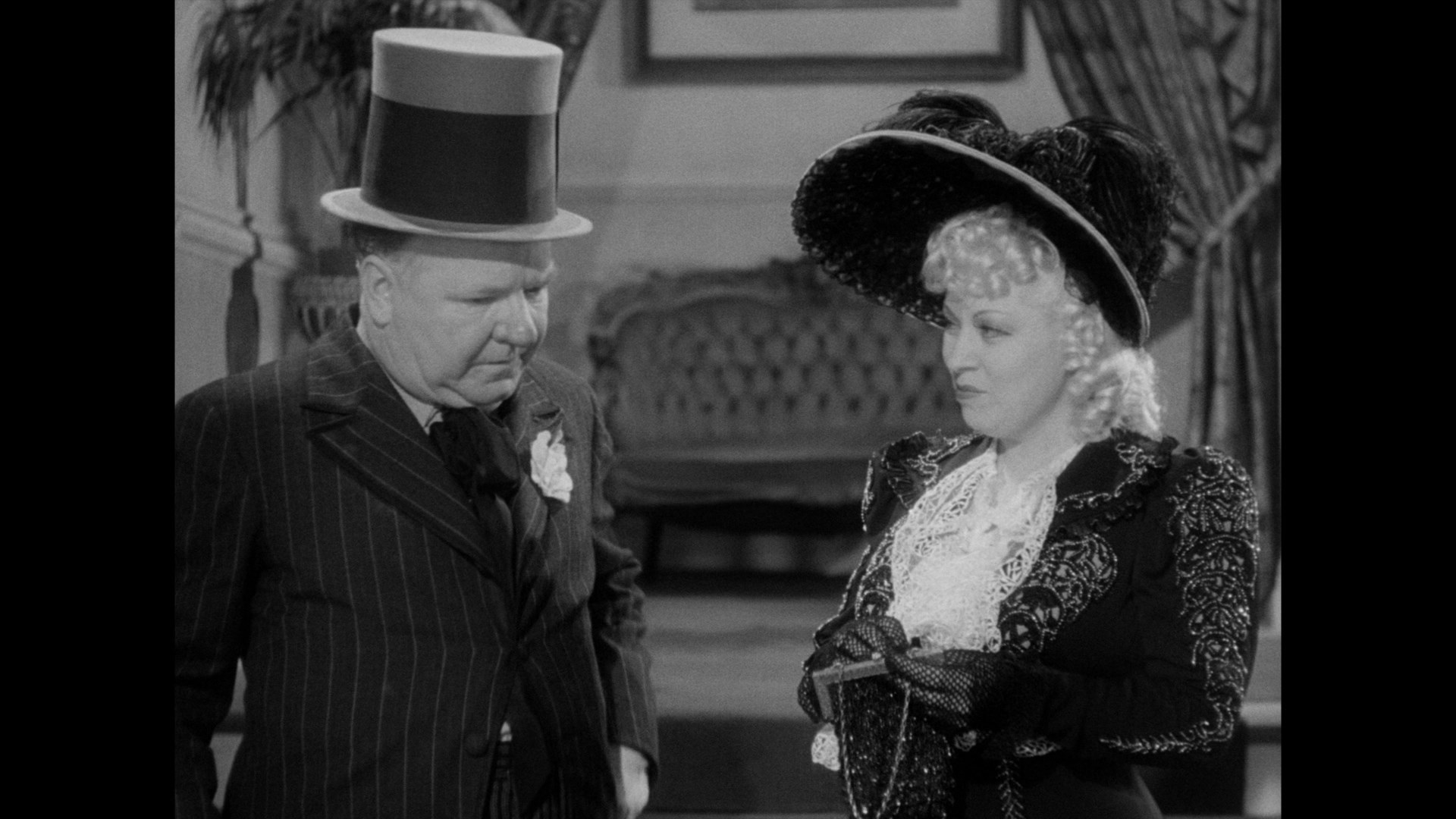 asserting a writing credit onto her script for his small one-scene addition. Whatever the case may be, the film itself is quite funny and charming as West goes, well, west again where, as Flower Belle Lee, she becomes smitten with the masked bandit who's holding up stagecoaches in the area. With her reputation besmirched by gossipy fellow passenger Margaret Hamilton (hot off The Wizard of Oz), she tries to set up a fake marriage with the presumably wealthy Cuthbert J. Twillie (Fields) while pursuing the bandit of her dreams. Obviously Universal was very confident in the production since they threw lots of costumes, sets, and extras all over the place, and at least on screen the teaming pays off with West and Fields getting to bounce off each other's personas (including a priceless final exchange). The Kino Lorber disc of this one featured a Heller-Nicholas / Nelson commentary, but this one features "A Love-Hate Relationship" (12m35s), a fascinating look at the film by Dr. Harriet Fields (yes, a descendant of the star himself) chatting about her obligation to keeping his legacy alive and how his career intersected with West all the way back to Broadway in the 1920s. The 4K restoration of the film (conducted in 2018) is pretty much spotless; it looks great from start to finish. Also on the disc is a big bonus, the 1982 made-for-TV biopic Mae West (95m32s) with Ann Jillian playing the Hollywood legend. Though she really doesn't look or act anything like the real-life West, Jillian is always fun to watch and gives it her all in a sparkly array of costumes worthy of the original herself. On top of that you get Piper Laurie as the stage mom from hell, James Brolin as the romantic interest, and Roddy McDowall as her gay best friend -- which results in the unforgettable sight of McDowall in drag. Perhaps the most surprising thing about this one is how dark and downbeat it is considering the subject matter, ending on a wistful note that contrasts a lot with the cheerful content elsewhere in the set. Also included are 1939's Hollywood Bowl (6m45s), another of those all-star cartoon pastiches with Fields depicted, the theatrical trailer, and a 65-image gallery.
asserting a writing credit onto her script for his small one-scene addition. Whatever the case may be, the film itself is quite funny and charming as West goes, well, west again where, as Flower Belle Lee, she becomes smitten with the masked bandit who's holding up stagecoaches in the area. With her reputation besmirched by gossipy fellow passenger Margaret Hamilton (hot off The Wizard of Oz), she tries to set up a fake marriage with the presumably wealthy Cuthbert J. Twillie (Fields) while pursuing the bandit of her dreams. Obviously Universal was very confident in the production since they threw lots of costumes, sets, and extras all over the place, and at least on screen the teaming pays off with West and Fields getting to bounce off each other's personas (including a priceless final exchange). The Kino Lorber disc of this one featured a Heller-Nicholas / Nelson commentary, but this one features "A Love-Hate Relationship" (12m35s), a fascinating look at the film by Dr. Harriet Fields (yes, a descendant of the star himself) chatting about her obligation to keeping his legacy alive and how his career intersected with West all the way back to Broadway in the 1920s. The 4K restoration of the film (conducted in 2018) is pretty much spotless; it looks great from start to finish. Also on the disc is a big bonus, the 1982 made-for-TV biopic Mae West (95m32s) with Ann Jillian playing the Hollywood legend. Though she really doesn't look or act anything like the real-life West, Jillian is always fun to watch and gives it her all in a sparkly array of costumes worthy of the original herself. On top of that you get Piper Laurie as the stage mom from hell, James Brolin as the romantic interest, and Roddy McDowall as her gay best friend -- which results in the unforgettable sight of McDowall in drag. Perhaps the most surprising thing about this one is how dark and downbeat it is considering the subject matter, ending on a wistful note that contrasts a lot with the cheerful content elsewhere in the set. Also included are 1939's Hollywood Bowl (6m45s), another of those all-star cartoon pastiches with Fields depicted, the theatrical trailer, and a 65-image gallery. 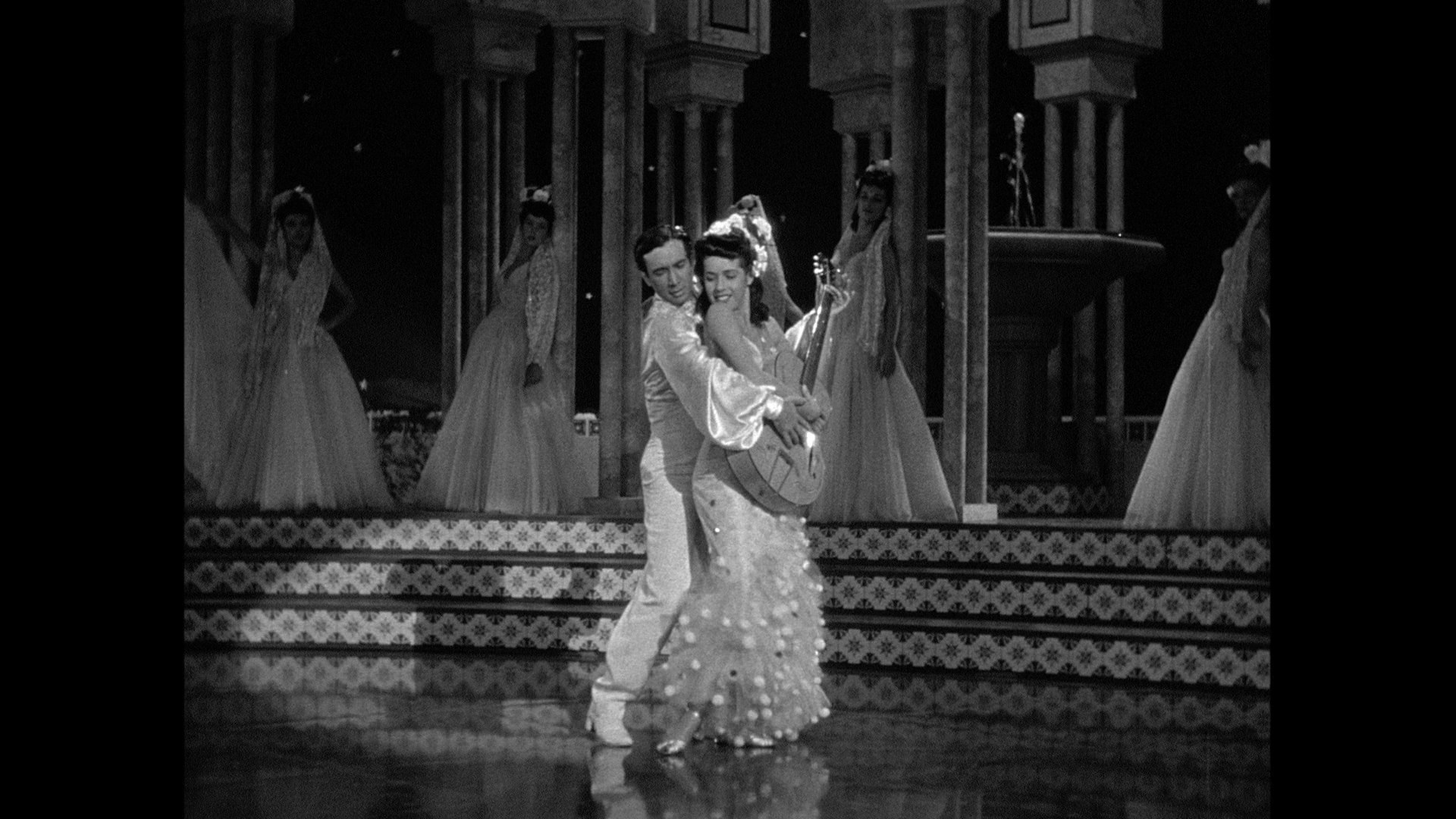 Finally on disc six we get the global
Finally on disc six we get the global 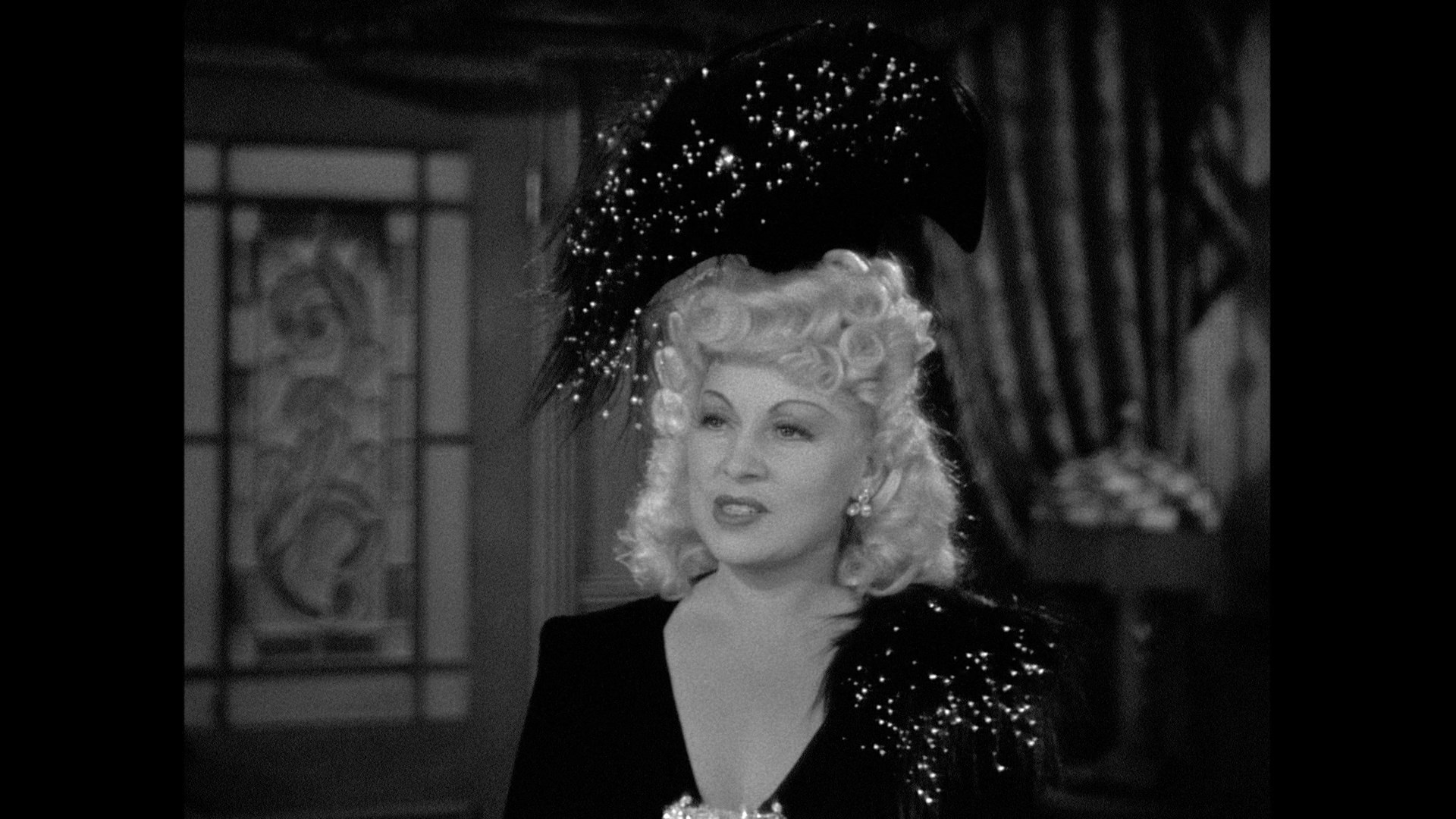 Blu-ray premiere of The Heat's On, West's final film for decades and her only one for Columbia Pictures. Done as a favor and a big fizzle at the box office, this one's suffered reputation-wise over the years due to the fact that, despite her top billing, this feels more like a musical revue type of film than a West vehicle. If you go in knowing that you'll have a better time with what amounts to a string of splashy nightclub performances, with Hazel Scott getting the best numbers and Cugat turning up again to do what he does best. The very thin wisp of a story focuses on Broadway star Fay Lawrence (West), who stars in big-time follies shows who's being scoped out by big-time producer Tony Ferris (Gaxton) to do his next big production after she ditched him earlier. Mostly after that she pops in and out of the film between acts, something that annoyed her fans to no end and led to her retirement from the big screen until the 1970s. Previously given a halfhearted release as a DVD-R by Sony, this one looks as stellar as you'd expect from the studio's HD output with a very natural, clean, clear presentation with natural film grain. Extras on this disc are light, consisting of the Super 8 version (19m53s) and a gallery of 32 images. Limited to 6,000 numbered units, the deluxe box comes with a hefty and beautifully illustrated 120-page book featuring a lengthy new biographical essay by Iris Veysey, extracts from West’s 1959 autobiography, archival articles and interviews (including a great 1927 piece about West's stint in jail for obscenity and a list of West's love tips), and film credits.
Blu-ray premiere of The Heat's On, West's final film for decades and her only one for Columbia Pictures. Done as a favor and a big fizzle at the box office, this one's suffered reputation-wise over the years due to the fact that, despite her top billing, this feels more like a musical revue type of film than a West vehicle. If you go in knowing that you'll have a better time with what amounts to a string of splashy nightclub performances, with Hazel Scott getting the best numbers and Cugat turning up again to do what he does best. The very thin wisp of a story focuses on Broadway star Fay Lawrence (West), who stars in big-time follies shows who's being scoped out by big-time producer Tony Ferris (Gaxton) to do his next big production after she ditched him earlier. Mostly after that she pops in and out of the film between acts, something that annoyed her fans to no end and led to her retirement from the big screen until the 1970s. Previously given a halfhearted release as a DVD-R by Sony, this one looks as stellar as you'd expect from the studio's HD output with a very natural, clean, clear presentation with natural film grain. Extras on this disc are light, consisting of the Super 8 version (19m53s) and a gallery of 32 images. Limited to 6,000 numbered units, the deluxe box comes with a hefty and beautifully illustrated 120-page book featuring a lengthy new biographical essay by Iris Veysey, extracts from West’s 1959 autobiography, archival articles and interviews (including a great 1927 piece about West's stint in jail for obscenity and a list of West's love tips), and film credits.![]()